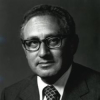Henry A. Kissinger

Henry A. Kissinger
Henry Alfred Kissingeris an American diplomat and political scientist. He served as National Security Advisor and later concurrently as United States Secretary of State in the administrations of presidents Richard Nixon and Gerald Ford. For his actions negotiating the ceasefire in Vietnam, Kissinger received the 1973 Nobel Peace Prize under controversial circumstances, with two members of the committee resigning in protest. Kissinger later sought, unsuccessfully, to return the prize. After his term, his advice has been sought by world leaders...
NationalityGerman
ProfessionStatesman
Date of Birth27 May 1923
CountryGermany
Because of the axiom that guerrillas win if they do not lose, stalemate is unacceptable, ... the military challenge in Iraq is more elusive.
Well, I don't know whether it caused anguish in China, but it was not a wise way to proceed. But one has to remember that it was the first experience. And in a Republican administration, there is a conservative wing that looks at China as the last embodiment of communism, which therefore tends towards a more bellicose rhetoric anyway than I would. It's not the dominant element, but every once in a while they get a crack at public statement.
Nixon had three goals: to win by the biggest electoral landslide in history; to be remembered as a peacemaker; and to be accepted by the 'Establishment' as an equal. He achieved all these objectives at the end of 1972 and the beginning of 1973. And he lost them all two months later-partly because he turned a dream into an obsession.
Everybody who has dealt with China over an extended period of time has come to more or less the same conclusions. There are nuances of differences, but not fundamental differences. I think that President Bush was heading in this direction, and I have no doubt that he will again wind up in this position. But right now he has to be preoccupied with the atrocity committed in New York and Washington.
The conventional army loses if it does not win. The guerrilla wins if he does not lose.
I want to get into the President's head some idea of what he can do. If military actions are recommended to him for decision, I want him to know what he is doing when he decides.
Congress can't do much more damage to us than they already have. To this extent we're liberated to do what is right. ... Our successors will be living in a nightmare if we don't do what is right.
an occasion to blow off their frustrations on an issue on which they didn't look as if they are begging (the United States) for help.
a review of withdrawal strategy ... seems in order.
My heart goes out to the president because I've served in an administration that faced a very divided country in a very difficult set of circumstances.
Ninety percent of all politicians give the other ten percent a bad reputation.
I'm confident John Bolton will bring peace to the world before he brings peace to his relations with The New York Times,
We will go where the facts lead us,
If you don't know where you are going, every road will get you nowhere.